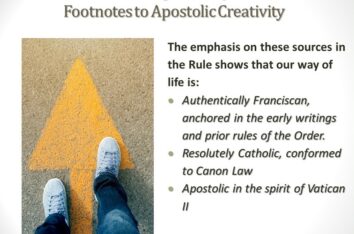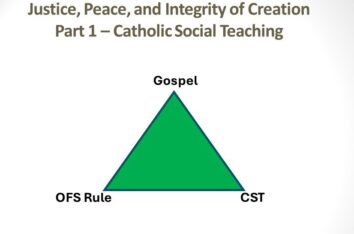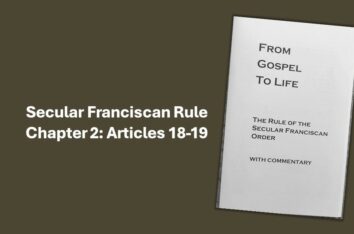Today’s lesson was written by Anne Mulqueen, OFS, Spiritual Assistant to the National Formation Commission. She discusses the importance of love in our fraternity. This lesson helps us to reflect on our own experiences in our fraternity and remember what made us feel joy. There will challenges, but these must be handled with purity of heart and love. Yes, it takes time to learn how to master relationships, but worth the time. I hope you enjoy this as much as I did. Peace, Dona
++++++++++++++++++++++++++++++++++++++++++++++++++++++++++++++++++++
The Call to Love
Anyone who has been processed for a significant amount of time knows that fraternity can be a source of great joy and great pain and a lot of emotions in between and, yet, it is our community of love. The virtue that allows us to experience great joy and overcome emotional pain is love. I like to think of love as the activating agent that enables the other virtues to flourish. Love is the balm for broken hearts and the wings to lift souls to God.
The Beatles once sang, “All you need is love.” And that’s a true statement, but what kind of love do we need? The Beatles may have been referring to Eros, sensual love, but Eros will never deliver balm to the soul or transcendence to the spirit.
Our rule speaks of love many times. Article 12 asks us to “acquire purity of heart …” so that we are free “… to love God and our brothers and sisters.” Article 19 asks us to honor the divine seed in everyone and to believe in the “…transforming power of love and pardon.” Article 22 identifies our fraternities as communities of love.
The love our Rule speaks of is warm, familial, spiritual, selfless, sacrificial, and unconditional. That is a tall order and one we grow into through conversion. Those of you familiar with the children’s book, The Velveteen Rabbit, know that becoming real—and for us, that means becoming holy—takes a long time. Blessedly, we have a God who loves us unconditionally. Now, what we have to do is believe it, respond to that love, and share it.
It would be unwise to end this Formation Friday message without mentioning that in addition to fraternal love, healthy boundaries are indispensable in human relationships. Healthy boundaries allow love to grow and thrive. Every person deserves respect and if someone is challenging the dignity of another, in love it must stop. Initially, it is best for those involved—not the whole fraternity—to settle the matter privately. (See Matthew 18:15-17) If this fails, pray and forgive that person, but maintain safe emotional boundaries.
When we follow Christ as Secular Franciscans, we resolve to love our brothers and sister even when it is inconvenient or possibly painful. Ponder these questions for personal reflection.
· Reflect on the love you may have experienced in fraternity.
o What effect did it have on you?
o Who in your fraternity could use a dose of fraternal love?
o Are you willing to supply it?
· Reflect on the pain or betrayal you may have experienced in fraternity.
o How did you handle it?
o Did you handle it at all?
o Has it changed you? In what way?
· What role does forgiveness play in our healing and our ability to love?
Thank you to Anne Mulqueen, OFS, Spiritual Assistant to the National Formation Commission, for allowing us to use her work.
+++++++++++++++++++++++++
El llamado al amor 11 de junio, 2021
Por favor, compartir con la fraternidad local.
Cualquiera que haya sido profesado por una cantidad significativa de tiempo sabe que la fraternidad puede ser una fuente de gran alegría y gran dolor y muchas emociones en medio y, sin embargo, es nuestra comunidad de amor. La virtud que nos permite experimentar una gran alegría y superar el dolor emocional es el amor. Me gusta pensar en el amor como el agente activador que permite que florezcan las demás virtudes. El amor es el bálsamo para los corazones quebrantados y las alas para elevar las almas hacia Dios.
Los Beatles cantaron una vez: “Todo lo que necesitas es amor.” Y esa es una afirmación verdadera, pero ¿qué tipo de amor necesitamos? Puede que los Beatles se hayan referido a Eros, el amor sensual, pero Eros nunca ofrecerá bálsamo para el alma ni trascendencia para el espíritu.
Nuestra regla habla del amor muchas veces. El artículo 12 nos pide “adquirir pureza de corazón …” para que seamos libres “… de amar a Dios y a nuestros hermanos y hermanas.” El artículo 19 nos pide que honremos la semilla divina en todos y que creamos en el “… poder transformador del amor y el perdón”. El artículo 22 identifica nuestras fraternidades como comunidades de amor.
El amor del que habla nuestra Regla es cálido, familiar, espiritual, desinteresado, sacrificado e incondicional. Esa es una tarea difícil y en la que crecemos a través de la conversión. Aquellos de ustedes familiarizados con el libro para niños, El conejo de terciopelo, saben que volverse real, y para nosotros eso significa volverse santo, lleva mucho tiempo. Afortunadamente, tenemos un Dios que nos ama incondicionalmente. Ahora, lo que tenemos que hacer es creerlo, responder a ese amor y compartirlo.
No sería prudente terminar este mensaje del viernes de formación sin mencionar que además del amor fraterno, los límites saludables son indispensables en las relaciones humanas. Los límites saludables permiten que el amor crezca y prospere. Toda persona merece respeto y si alguien está desafiando la dignidad de otro, en el amor debe detenerse. Inicialmente, es mejor para los involucrados, no para toda la fraternidad, resolver el asunto en privado. (Ver Mateo 18: 15-17) Si esto falla, ore y perdone a esa persona, pero mantenga límites emocionales seguros.
Cuando seguimos a Cristo como franciscanos seglares, decidimos amar a nuestros hermanos y hermanas incluso cuando sea inconveniente o posiblemente doloroso. Reflexione sobre estas preguntas para una reflexión personal.
• Reflexione sobre el amor que puede haber experimentado en la fraternidad.
o ¿Qué efecto tuvo en usted?
o ¿A quién en su fraternidad le vendría bien una dosis del amor fraterno?
o ¿Está dispuesto a suministrarlo?
• Reflexione sobre el dolor o la traición que puede haber experimentado en la fraternidad.
o ¿Cómo lo manejó?
o ¿Lo manejó en absoluto?
o ¿Le ha cambiado? ¿En qué manera?
• ¿Qué papel juega el perdón en nuestra curación y nuestra capacidad de amar?
Gracias a Anne Mulqueen, OFS, Asistente espiritual de la Comisión Nacional de Formación, por permitirnos utilizar su trabajo.
Diane F. Menditto, OFSChair, National Formation Commission
Minister, Our Lady of the Angels Region


